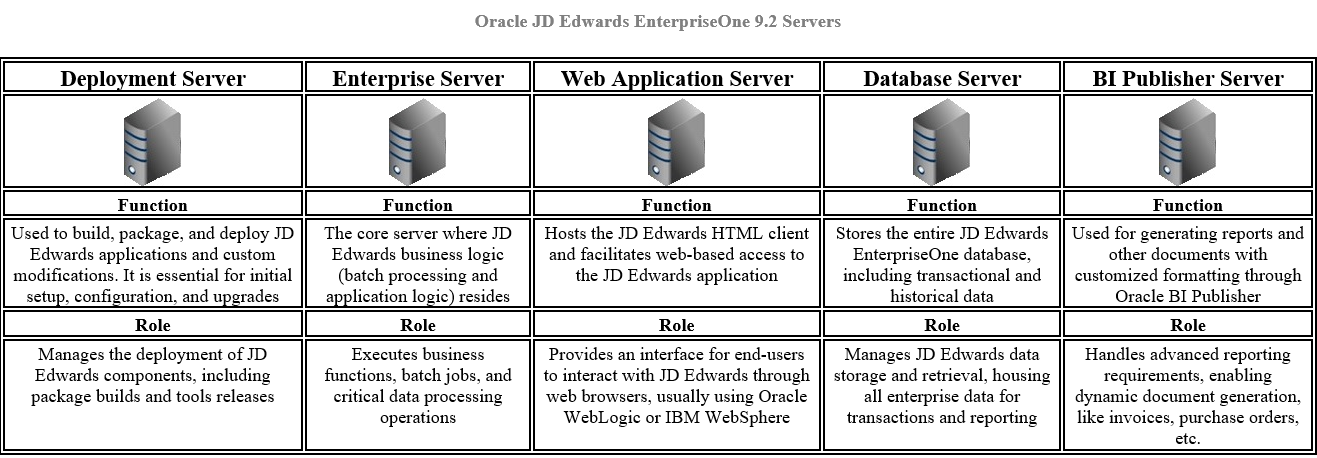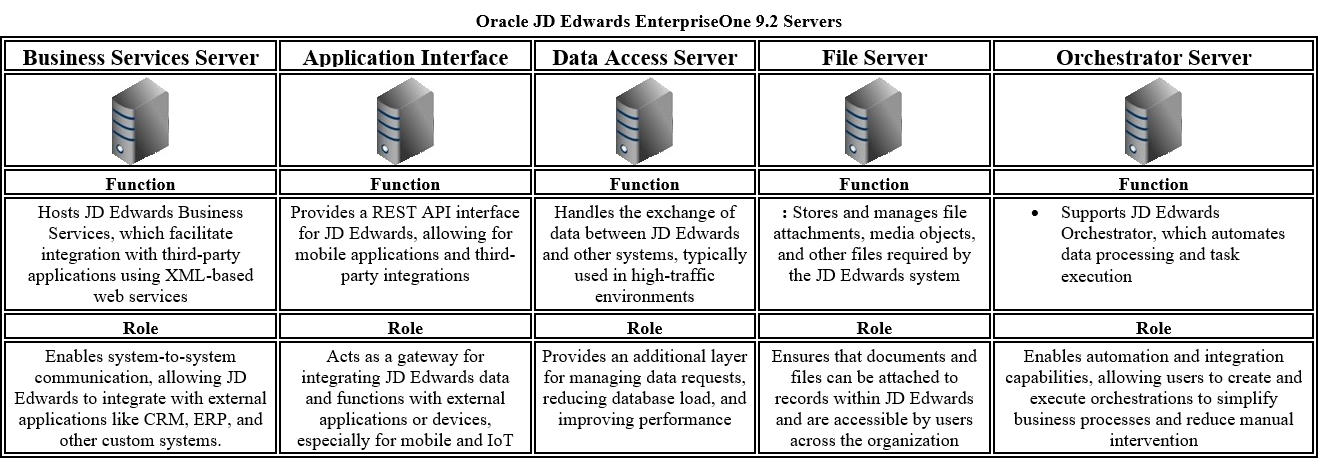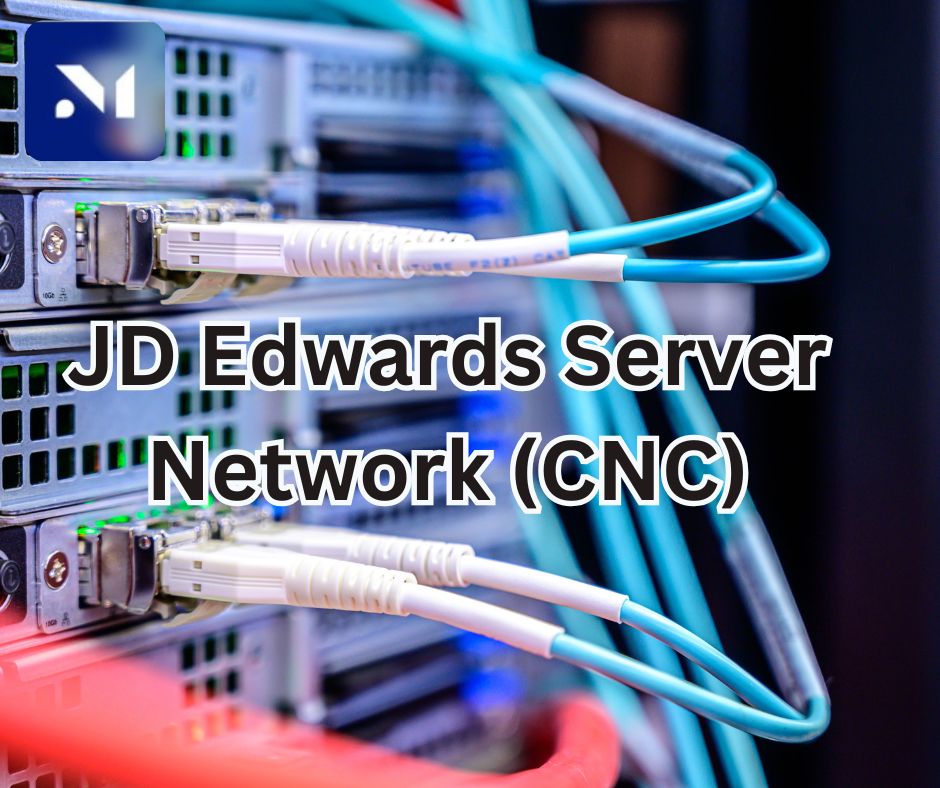Oracle J.D. Edwards
JD Edwards Servers: Core Components for Optimal Performance & Integration
Powering Performance, Enabling Integration – The Backbone of JD Edwards Success
Configurable Network Computing (CNC)
Oracle JD Edwards Configurable Network Computing (CNC) is essentially the technical backbone of the JD Edwards ERP system, responsible for making sure that all parts of the system work well together across a network. The CNC concept separates the software into three main layers, allowing flexibility and efficient management:
- Database Layer: Stores all of the data, such as customer details, financial records, and inventory. This layer keeps the data safe and organized.
- Application Layer: Processes the business logic. This is where the actual “thinking” happens, like calculating prices, checking stock levels, or generating reports. The application layer processes the data according to the rules set by the business.
- Presentation Layer: This is what users see on their screens. It provides the interface that employees interact with, whether they’re using a computer, tablet, or even a mobile device.
The power of CNC is that it separates these layers, making the system adaptable and scalable. This separation allows businesses to update, maintain, or change one layer without disrupting the others, making the system both flexible and reliable. CNC also supports multiple operating systems and databases, making it a highly versatile and configurable solution that can adapt to different technical environments.
In short, CNC enables JD Edwards to be highly flexible and easy to manage across different locations, devices, and business needs, which is crucial for companies that are growing or have complex operational requirements.
JD Edwards Servers

JD Edwards (JDE) ERP operates on a robust, multi-tier server architecture that efficiently supports complex business operations. This architecture is designed to separate and balance workloads, ensuring high performance, scalability, and adaptability across an organization. Each server in the JD Edwards environment plays a specialized role, working together to process data, execute business logic, and deliver an intuitive user experience.
By distributing tasks across multiple servers, JD Edwards enhances data security, system reliability, and response times. This structure not only streamlines daily operations but also provides the flexibility to scale with a business as it grows, adapt to changes in demand, and support a variety of technical environments.
In summary, JD Edwards servers form a powerful backbone that supports seamless business processes, enabling companies to manage data, workflows, and applications with agility and efficiency.
For Oracle JD Edwards EnterpriseOne 9.2, a robust infrastructure with multiple servers is typically required to ensure optimal performance and scalability. Here’s an outline of the main servers needed and their functions:
- Deployment Server
- Function: Used to build, package, and deploy JD Edwards applications and custom modifications. It is essential for initial setup, configuration, and upgrades.
- Role: Manages the deployment of JD Edwards components, including package builds and tools releases.
- Enterprise Server
- Function: The core server where JD Edwards business logic (batch processing and application logic) resides.
- Role: Executes business functions, batch jobs, and critical data processing operations.
- Web Application Server
- Function: Hosts the JD Edwards HTML client and facilitates web-based access to the JD Edwards application.
- Role: Provides an interface for end-users to interact with JD Edwards through web browsers, usually using Oracle WebLogic or IBM WebSphere.
- Database Server
- Function: Stores the entire JD Edwards EnterpriseOne database, including transactional and historical data.
- Role: Manages JD Edwards data storage and retrieval, housing all enterprise data for transactions and reporting.
- BI Publisher Server (Optional)
- Function: Used for generating reports and other documents with customized formatting through Oracle BI Publisher.
- Role: Handles advanced reporting requirements, enabling dynamic document generation, like invoices, purchase orders, etc.

- Business Services Server (BSSV)
- Function: Hosts JD Edwards Business Services, which facilitate integration with third-party applications using XML-based web services.
- Role: Enables system-to-system communication, allowing JD Edwards to integrate with external applications like CRM, ERP, and other custom systems.
- Application Interface Services (AIS) Server
- Function: Provides a REST API interface for JD Edwards, allowing for mobile applications and third-party integrations.
- Role: Acts as a gateway for integrating JD Edwards data and functions with external applications or devices, especially for mobile and IoT.
- Data Access Server (DAS) (Optional)
- Function: Handles the exchange of data between JD Edwards and other systems, typically used in high-traffic environments.
- Role: Provides an additional layer for managing data requests, reducing database load, and improving performance.
- File Server (Optional)
- Function: Stores and manages file attachments, media objects, and other files required by the JD Edwards system.
- Role: Ensures that documents and files can be attached to records within JD Edwards and are accessible by users across the organization.
- Orchestrator Server
- Function: Supports JD Edwards Orchestrator, which automates data processing and task execution.
- Role: Enables automation and integration capabilities, allowing users to create and execute orchestrations to simplify business processes and reduce manual intervention.
Each of these servers can be configured based on the specific size, performance, and scalability requirements of your JD Edwards deployment, ensuring efficient processing and a seamless user experience
J.D. Edwards is supported by MEBSCO
We specialize in supporting JD Edwards ERP, providing comprehensive implementation, customization, and ongoing support services. With a deep understanding of JD Edwards, we empower businesses across industries like pharmaceuticals, agriculture, retail, and real estate to optimize their processes, improve efficiency, and drive growth. Our expertise ensures that your JD Edwards system is fully aligned with your unique business needs, enabling you to achieve long-term success.


